|
|
|
|
|
|
|
|
HEALTH NEWS

Health Literacy Month
Health literacy is about more than reading or numerical literacy—even well-educated people can be unfamiliar with medical terms, how our bodies work and how to interpret medical statistics. Research shows that most patients don’t fully understand the information we give them. In fact, nearly 9 out of 10 American adults report difficulty using the everyday health information available in healthcare facilities, retail outlets, media and communities.
This Health Literacy Month, consider using a "universal precautions” Health Literate Care Model to improve our communities’ understanding of their medical conditions, engage them into preventive care and advance health equity. Action steps can include:
- Approaching all patients as if they are at risk of not understanding health information
- Asking patients to explain in their own words how they are going to take care of themselves (teach-back method)
- Encouraging questions to reduce uncertainty and giving patients confidence that they can manage their conditions
Click the links for resources on the Health Literate Care Model, a toolkit from the Agency for Healthcare Research and Quality and this Organizational Health Literacy Toolkit from UT Health’s Health Confianza.
Easy-to-understand patient materials include red/yellow/green zone tools for common health conditions (also available as a page of QR codes here) and Health Confianza’s resources on accessible low-cost local clinics for patients (preventive care, dental, mental health and dermatology). The webpage is available in English and Spanish.
|
|
|
|
HEALTH NEWS
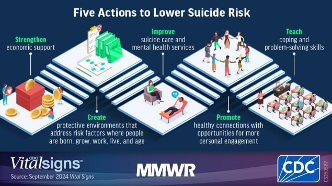
Which Economic Conditions Connect to Suicide Risk?
Broadband internet access, health insurance coverage and income correlated significantly with suicide rates, according to a recent CDC report. Men, rural residents and people of American Indian/Alaska Native descent were more likely to die by suicide. The CDC found that in 2022, suicide rates were 44% lower in counties with the most broadband access, compared with those with the least, and that counties with the highest health insurance coverage had suicide rates 26% lower than those with the least coverage.
Suicide is a leading cause of preventable deaths, and rates continue to rise. CDC’s Suicide Prevention Resource for Action details evidence-based strategies to reduce suicide, including strengthening economic supports (including income and housing), creating protective environments, improving access to mental health care and generating healthy connections with peers and communities. Download the summary here or full document here.
Texas Maternity Mortality Rose in 2020, 2021
A new state report showed that the Texas Enhanced Maternal Mortality Ratio rose dramatically in 2020 and 2021, and not just because of COVID-19. Black women continued to be the most disproportionately affected, and 80% of deaths were preventable. The ratio of 17.2 deaths per 100,000 live births in 2019 grew to 27.7 per 100,000 in 2020 and 37.7 in 2021. If COVID-19 maternal deaths are excluded, the ratios would be 24.2 per 100,000 in 2020 and 23.0 in 2021.
More than 46% of Texas counties were defined as maternity care deserts last year, above the national average, and at a glance the map appears worse in 2024. The March of Dimes’ Texas report is pending; national recommendations include more telehealth and reimbursement for doulas. Download the March of Dimes report here and Executive Summary here. Maternal health care is scarce in rural Texas, where 17 OB units closed from 2011 to 2021. Recommendations of a rural Texas maternal health workgroup will become available in mid-October here.
Be on the Lookout for Oropouche in Travelers
An emerging insect-borne virus is affecting travelers from Cuba: Oropouche virus. This arthropod-borne pathogen, a member of the Orthobunyavirus genus, is transmitted via bites from infected midges. Since August, 21 cases were reported among U.S. travelers returning from Cuba. No current vaccine, test or treatment is available, however symptoms are similar to those of dengue, for which early treatment can be lifesaving. Oropouche virus disease typically presents as an abrupt onset of fever, severe headache, chills, myalgia and arthralgia, with an incubation period of 3-7 days. Click on the links to read the alert, CDC clinical guidance and MMWR. Please recommend insect repellant to people traveling to current endemic areas of Brazil, Colombia, Bolivia, Peru and Cuba.
21-Valent Pneumococcal Vaccine OK’ed for Adults
Adults aged 19 and older with risk factors for pneumococcal disease, who are currently recommended to receive a dose of PCV 15 or PCV 20, may receive a single dose of PCV 21, according to the CDC’s Advisory Committee on Immunization Practices. Prior recommendations included either PCV 20 alone or a series including PCV 15 and PPSV 23. The new FDA-approved formulation adds 8 new serotypes but omits some previously covered strains, notably serotype 4. Consider the new vaccine in seniors and younger adults with an immunocompromising condition, CSF leak or cochlear implant. Click the hyperlinks for the MMWR, standing orders and patient information and a Pneumococcal Vaccine Timing table.
Do pneumococcal vaccine options make your head spin? Download the PneumoRecs VaxAdvisor App (Apple/Android) or access the web version to walk you through the decision-making process.
|
|
|
|
| COVID CORNER
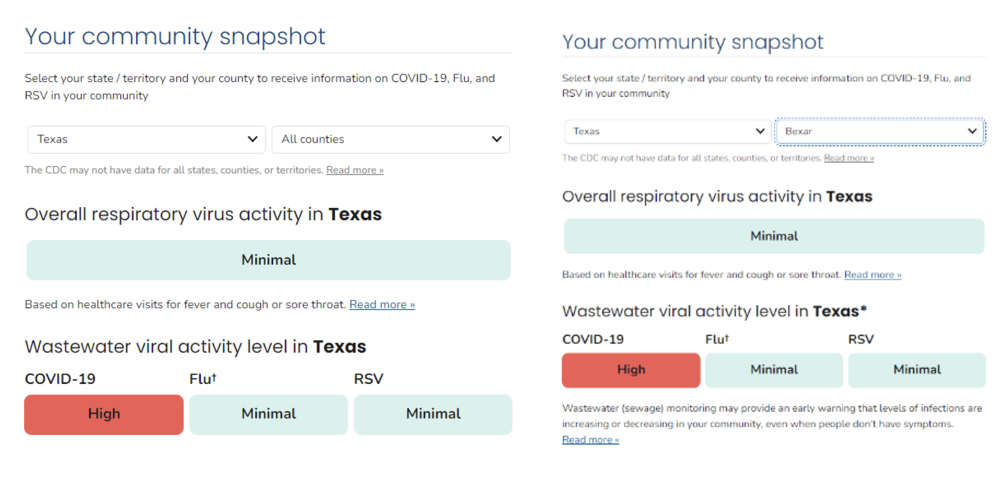
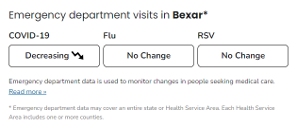
CDC Unveils Respiratory Illnesses Data Channel
Looking to find our community’s levels of respiratory virus activity? Visit the CDC Respiratory Illnesses Data Channel for weekly updates on the levels of COVID-19, flu and RSV. You can view national, state and local trends via overall and wastewater levels of the viruses as well as emergency department visits. The site also provides a national summary that includes vaccination coverage. Check it out here. Pediatric influenza deaths are separately tallied here -- and notably, pediatric flu deaths this season topped the previous record of 199.
Updated Guidance Arrives for 2024-2025 COVID-19 Season
Respiratory virus season is in full swing, and the CDC has posted new Interim Clinical Considerations for Use of COVID-19 Vaccines in the United States. The 2024–2025 COVID-19 vaccines are recommended for everyone aged ≥6 months to target currently circulating SARS-CoV-2 strains and provide additional protection against severe COVID-19–associated illness and death.
Read the MMWR here. Click here for up-to-date clinical resources on COVID-19 from immunize.org.
Metro Health continues to offer free pop-up vaccine clinics for uninsured or underinsured children under the Vaccines for Children program; click here to view the schedule. At this time, the Texas Adult Safety Net program does not cover COVID-19 vaccines, however, this is anticipated to change soon.
COVIDtests.gov Reopens
U.S. households can once again order up to 4 COVID-19 tests per address through covidtests.gov. Additionally, COVID-19 tests continue to be available to uninsured individuals who are symptomatic or have been exposed at locations listed here: https://testinglocator.cdc.gov/
Medicare Reimburses In-Home Vaccinations
Medicare will reimburse in-home COVID-19, flu, pneumococcal and Hepatitis B vaccinations for patients who have a disability or other challenges visiting vaccine providers. Medicare reimburses approximately $40 per COVID dose administered and $30 for other vaccine types, plus one in-home administration payment of $38 for CY 2024, if the “sole purpose of the visit is to administer 1 or more Part B preventive vaccines (including the COVID-19 vaccine).” Use HCPCS Level II code M0201.
Practitioners don’t need to certify that the member is homebound, but must document the clinical status or barriers faced to getting the vaccine outside of the home. These barriers may include disability or clinical, geographical or socioeconomic conditions that significantly reduce their ability to reach a pharmacy or clinic, including “challenges with transportation, communication or caregiving.” Patients may also be eligible if they have a condition that
- Restricts their ability to leave home without a supportive device or help from a paid or unpaid caregiver,
- Makes them more susceptible to contracting a disease, or
- Requires a considerable and taxing effort to leave home.
For details and limitations, visit this Medicare page.
| |
|
|
|
MPOX
What Pediatric Providers Need to Know
HHS recently offered an update for pediatric providers on the clade I mpox outbreak in several African countries, including the Democratic Republic of Congo. While no current cases of clade I mpox exist in the U.S., and risk remains low, providers should be aware that the infection can propagate through household contact. Missed the live webinar? No problem, you can watch it here.
The mpox vaccine is available commercially through standard vaccine distributors and at the Metro Health STI Clinic at 512 E. Highland Blvd, Ste. 150. Home self-testing is available by prescription through LabCorp’s provider platform. Treatment is available through the STOMP trial at UT Health San Antonio, 1-855-876-9997. STOMP is a NIAID-funded clinical trial to evaluate the effectiveness of the antiviral tecovirimat, also called TPOXX. People can self-enroll at https://www.stomptpoxx.org/main.
Contact information:
University of Texas San Antonio Clinical Research Site
7703 Floyd Curl, Dr, San Antonio, TX 78229
210-567-4823
| |
|
|
|
RESOURCE(S) OF THE MONTH

Vot-ER.org
Vot-ER is a nonprofit organization that focuses on increasing civic engagement by providing opportunities for patients to register to vote or update voter registration information during health care visits. With civic engagement now recognized as a non-medical driver of health, yet trending in the wrong direction, this is a way for healthcare professionals to encourage engagement in a non-partisan way. Healthcare professionals can order a free badge with a QR code that patients can scan to register themselves to vote. The badge can be worn with other identification in the office. It’s a simple way to encourage participation in democracy. Visit https://vot-er.org/ to learn more and order your badge!
Texas Launches Congenital Syphilis Dashboard
Congenital syphilis continues to rise across the United States, with Texas accounting for 25% of all cases in 2022, despite making up only 10% of total births. In response, the Texas Department of State Health Services (DSHS) developed a dashboard featuring county and statewide data trends, risk factors, screening and testing requirements, and treatment guidelines. Click below for:
If you’re confident in your knowledge of syphilis, try our new interactive, case-based training, where you will have the opportunity to apply your knowledge of syphilis testing, staging, treatment and follow-up in diverse patients. Clinicians can sign up for Syphilis 201 (Case Studies) by clicking here. Free CME and CNE offered.
NEW Clinician Toolkit for Syphilis
The Clinical Training Center for Sexual and Reproductive Health released an easy to follow and up-to-date toolkit that offers tools, job aids, and evidence-based resources to guide clinicians in screening, testing, staging and treating syphilis. Access the kit free here.
NEW Resources on Point-of-Care Tests for Syphilis
Adding to existing point-of-care (POC) syphilis tests that detect antibodies to Treponema pallidum in about 15 minutes in clinical settings, the FDA recently approved an over-the-counter test for consumers to use at home. POC testing makes sense in places where syphilis rates are high and access to healthcare is limited. They should not be used for patients with a known history of a syphilis diagnosis, in which case non-treponemal tests (RPR, VDRL) are preferred. Click the links for implementation details and a script to discuss rapid tests with patients.
|
|
|
|
EDUCATIONAL OPPORTUNITIES
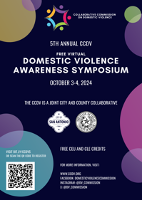
Oct. 3 – 4, 8 a.m. to 5 p.m. – 5th Annual Domestic Violence Awareness Symposium (CME and CLE credits available)
The Collaborative Commission on Domestic Violence is excited to host the 5th Annual Domestic Violence Awareness Symposium. This free event welcomes both professionals and community members to engage with and learn from leading experts in the field. All are encouraged to attend, regardless of professional or educational background. Click here to register.
Oct. 2, 12 p.m. to 1 p.m. – Syphilis 101 (1 hour CME/CNE)
Syphilis cases continue to climb in San Antonio – are you ready to make the diagnosis? Join your Metro Health Clinician Ambassador team for another opportunity to learn the basics of syphilis testing, staging, treatment and follow-up. Register here.
Oct. 3, 12 p.m. to 1 p.m. – Food as Medicine in Pediatrics: A Necessary Responsibility (CHES/MCHES credits available)
Join the Michael & Susan Dell Center for Healthy Living at UTHealth Houston School of Public Health and speaker Kofi Essel, MD, MPH, FAAP, Food as Medicine Director for Elevance Health, and Clinical Associate Professor of Pediatrics at the George Washington University School of Medicine and Health Sciences, for the 9th Annual Philip R. Nader Legacy of Health Lectureship. This year, the event will focus on “food as medicine” in promoting community health and well-being. Register here.
Oct. 17, 11 a.m. to noon – Inside TCHMB: A Conversation with Collaborative Leadership
Join the Michael & Susan Dell Center for Healthy Living and the UTHealth Houston School of Public Health for a panel discussion with leaders of the Texas Coalition for Healthy Mothers & Babies (TCHMB). The discussion will highlight key partnerships that are driving innovation and improving outcomes for mothers and babies across Texas. Don’t miss this chance to connect with leaders and explore how we can work together to make a lasting impact. Click here to sign up.
Oct. 23, 11 a.m. to noon – Caring for Transgender and Gender Diverse Youth at Health Centers
The National LGBTQIA+ Health Education Center hosts a webinar focused on practical strategies for reaching and engaging trans and gender-diverse youth in primary and behavioral health care. The session will explore the culture of trans and gender-diverse youth and provide guidance on building trusting, respectful relationships with this community. Click here to register.
Oct. 24, 9:30 a.m. to 4 p.m. - Screening and Treating Tuberculosis Infection
You’re invited to join the Heartland National TB Center for their course, Screening and Treating Tuberculosis Infection. This in-person training will provide healthcare providers with up-to-date guidelines on screening and treatment of persons for TB infection via lecture and case study discussions. The deadline to register is Oct. 17, and space is limited to 30 persons, so register today!
Oct. 24, 12:00 a.m. to 1:00 p.m. - Doxy PEP Lunch & Learn
Want to know more about Doxycycline as post-exposure prophylaxis (DoxyPEP)? Join the Denver Prevention Training Center (PTC), St. Louis PTC, and Southeast PTC as their clinical faculty provide you with a clinical update on DoxyPEP. Register here. View the flyer for more information here.
Additional sessions:
Oct. 30 – 11:00 a.m. to 12:00 pm – Hosted by NYC PTC, PTC at Johns Hopkins and Ratelle PTC
Nov. 7 – 2:00 p.m. to 3:00 p.m. - University of Washington PTC, California PTC
Getting In Sync with Sexual Health ECHO: STIs - Testing, Treatment and Prevention (1-hour CME)
Project Echo will host a STI series every other Tuesday from 11 a.m. – noon. until the end of the year to cover sexual history taking and STI screening, prevention, and treatment. Register now for one of the sessions below.
Oct. 1 – Gonorrhea, Chlamydia/LGV, Trichomonas, DoxyPEP
Oct. 15 – Syphilis
Oct. 29 – HSV
Nov. 12 – HIV (PrEP and nPEP)
Nov. 26 – Hepatitis B and C
Dec. 10 – HPV, Mpox, Mycoplasma/Ureaplasma
Texas PeriPAN Grand Round Series (1 hour CME)
The Perinatal Psychiatry Access Network (PeriPAN) is hosting evidence-based practice discussions with Texas Tech University Health Sciences Center every 3rd Tuesday of the month from noon – 1 p.m. Register now for one of the sessions below.
Oct. 15 – Paternal Mental Health and the Perinatal-Postpartum Periods
Nov. 19 – NICU Parent Supports and Considerations
TxRx ECHO (Medications for Substance Use Disorders) (1 hour CME)
Attention prescribers and allied care team members! Join UT Health San Antonio, and C-Stat by Be Well Texas every 2nd and 4th Thursday of the month from noon – 1 p.m., beginning Oct. 24 for this informative and engaging educational opportunity. Participants will receive telementoring from experts in the use of medications to treat substance use disorders including alcohol, opioids, and stimulants. Register here.
|
|
|
|
SAVE THE DATE
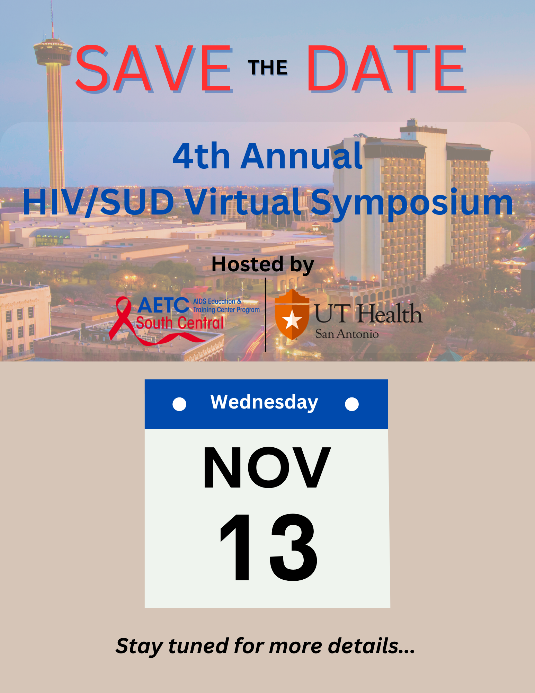
4th Annual HIV/SUD Virtual Symposium
UT Health San Antonio South Central AIDS Education and Training Center will host their 4th annual HIV/SUD Symposium virtually on Wednesday, Nov. 13. More information coming soon!
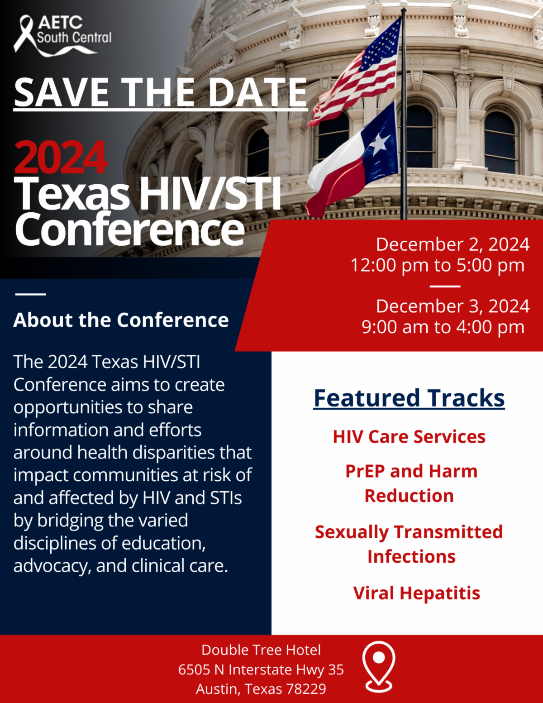
2024 Texas HIV/STI Conference
Mark your calendars to join South Central AETC in Austin on Dec. 2-3 for this informative 1.5-day conference. Topics will include PrEP and harm reduction, hepatitis, HIV care services, and Sexually Transmitted Infections.
|
|
|
|
|
|
|
SA Kids B.R.E.A.T.H.E.
Looking for an opportunity to refresh your knowledge around asthma and albuterol medication policies in schools? Earn a Certificate of Completion by watching this on-demand recording and completing a short survey. Certificates will be emailed after completion. (1.5 contact hours available)
To receive the recording, click here and complete the form. (Link will expire Oct. 12, 2024.) View webinar agenda.
For additional lung health education opportunities, visit Lung.Training. If you have any questions, please email LungFriendly@lung.org.
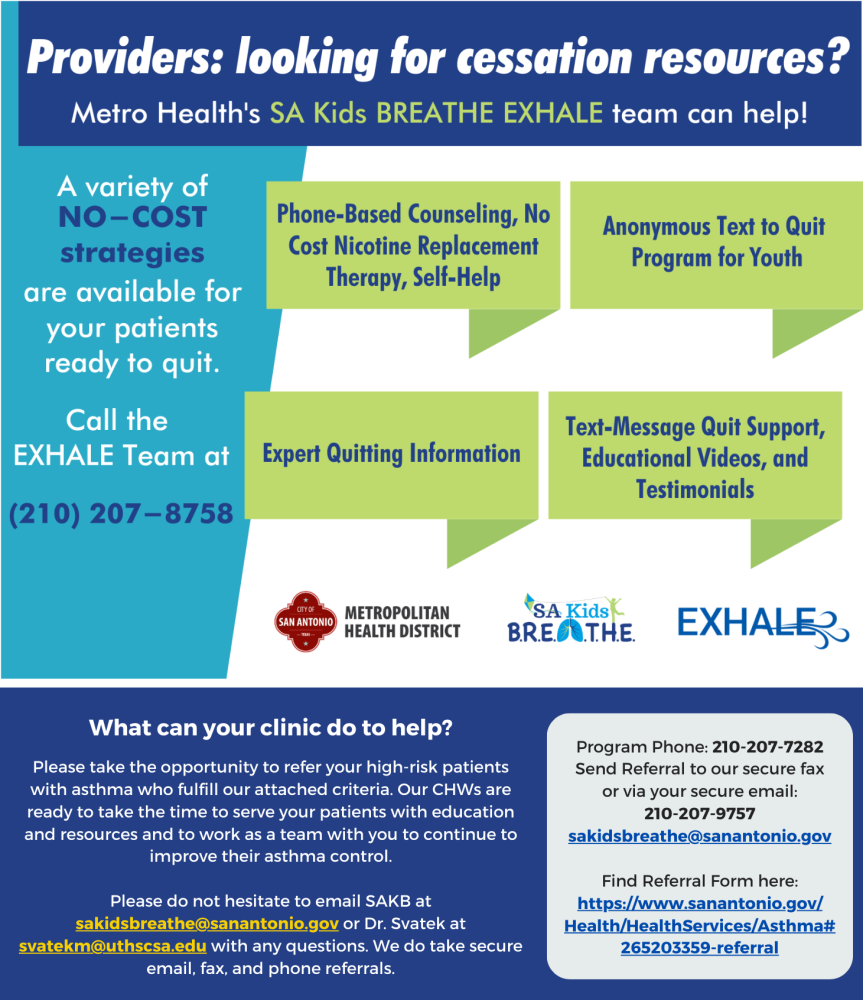
|
|
|
|
| Your Clinician Ambassadors
| |
|
|
|
Lucinda Lundy Zeinelabdin, MSN, APRN, FNP-C
Clinician Ambassador Family Nurse Practitioner
Lucinda.Zeinelabdin2@sanantonio.gov
210-207-2407
|
|
|
|
Diana Morales, BSN, RN
Clinician Ambassador Public Health Nurse
Diana.Morales1@sanantonio.gov
210-207-5102
|
|
|
|
For health alerts from Metro Health text "DOCALERT" to 1-844-824-COSA (2672)
By participating, you consent to receive up to 4 text messages per month from Metro Health. Message and data rates may apply.
SCAN HERE
You can now self-schedule your virtual academic
detailing sessions with the Clinician Ambassador team!
|
|
|
|
|
|
|
|
|
|
|